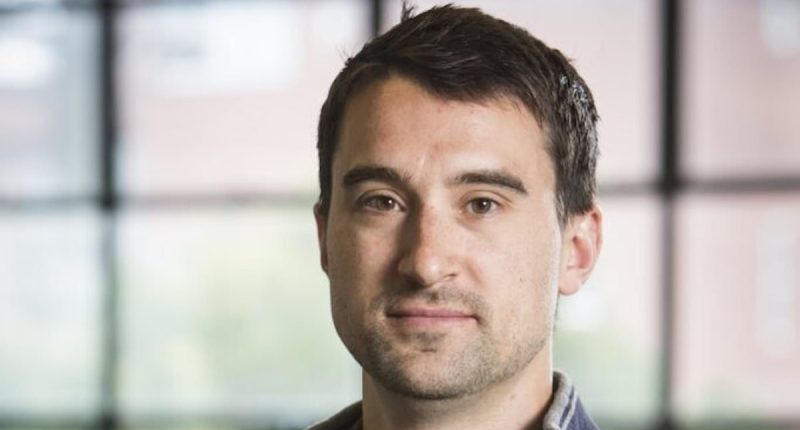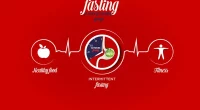Share this @internewscast.com
Brent Franson wasn’t afraid of dying. He was afraid of dying from Alzheimer’s disease.
He remembers seeing sufferers on TV growing up, with their listless expressions and inability to walk. It left him certain he did not want to develop the devastating condition.
His worst fear was revealed when he used the Death Clock – an artificial intelligence that predicts – down to the minute – when and how a person will die.
Franson invented the app, which analyzes a person’s body metrics and lifestyle, and input his own information. The 43-year-old was shocked when the Death Clock projected his demise at 76 years old.
Among possible causes of his death: Alzheimer’s. It made sense, Franson thought.
In his 20s, he had become addicted to anti depressants and sedatives, which left him unable to sleep properly for a decade – a risk factor for neurological decline – and he had a gene that predisposed him to dementia.
Franson was also working late, eating large late-night dinners and balancing his role as husband and father-of-three.
Determined to change his fate, however, Franson made major lifestyle changes – becoming what he called a ‘sleep athlete.’ He fine-tuned his schedule to make time for rest and exercise and to create a better work-life balance.
One year later, he ran his information through the Death Clock again and it revised its estimate — adding an extra nine years to his life expectancy.

Brent Franson is the CEO of Death Clock, a groundbreaking app that gives users a prediction of the day they are going to die
The most likely cause of death? Alzheimer’s was still a possibility, but so were cardiovascular diseases and cancer.
‘Something does have to kill you eventually,’ Franson told DailyMail.com.
He added: ‘My biggest fear in life, it’s not death. It’s Alzheimer’s. Just the thought of having to live with Alzheimer’s — so this was really a wake-up call for me.’
As the aging population of the US continues to grow, so will the rates of dementia. Currently, an estimated 6.8million Americans have Alzheimer’s disease – the most common form of dementia – the vast majority of whom are over 65 years old.
By 2050, this number is projected to rise to nearly 13 million.
A lack of sleep – especially a lack of deep sleep – has been linked to an increased risk of Alzheimer’s in numerous studies.
Experts say it stops the body from clearing out waste products from the brain — raising the risk of dangerous amyloid beta protein clumps forming that raise someone’s risk of the disease.
More than one in three adults — 50 to 70million people — regularly do not meet the CDC’s recommendation of at least seven hours of sleep every night.
One study has suggested sleeping six or fewer hours per night before age 70 is linked to a 30 percent increased risk of dementia compared to people getting seven hours or more.
It can also drive other unhealthy behaviors, like exercising less or eating more sugary treats, which can also raise risk.
To boost his sleep, and slash his risk of Alzheimer’s, Franson began by banning all mobile phones from the bedroom.
He set a consistent bedtime of 9.30pm, and made sure to have his last meal at 5.30pm every night.
Scientists say a consistent bedtime helps the body’s circadian rhythm while eating too close to bedtime means the body is still digesting, disrupting sleep. Some suggest it can take three to four hours for a meal to transit into the intestines.
He also lowered the bedroom temperature to 60 degrees Fahrenheit (15 degrees Celsius). Experts recommend sleeping at temperatures between 60 and 67 degrees to reduce the body’s internal temperature and ensure a restful night’s sleep.
He had two sets of blackout blinds installed in his bedroom, as well. One that descends horizontally from the ceiling, and another that moves vertically across the window, to block out all light while he sleeps.

The Death Clock app asks users to describe their lifestyle, including exercise and diet
Another lifestyle change was cutting out alcohol.
Alcohol has also been linked to sleep disruption, reducing the amount of time spent in REM sleep — a stage for memory consolidation — disrupting the sleep cycle.
The Alzheimer’s Society says drinking alcohol also reduces the volume of the brain’s white matter, which helps the brain transmit signals between different regions.
This can lead to issues with the way the brain functions. Alcohol can also shrink the parts of the brain involved in memory.
Franson also makes sure to exercise during the day, saying he alternates between weight lifting, cardio exercises and yoga.
A July 2022 study published in the journal Neurology analyzed the health information of 501,400 people from a British health database over 11 years. Researchers found people who engaged in consistent vigorous activity — sports or working out — had a 35 percent reduced risk of developing dementia.
Even people who reported completing household chores saw a benefit and had a 21 percent lower risk of dementia.
A separate October 2022 meta-analysis of 38 international studies found people who engaged in activities like regularly walking, running, dancing, playing sports or swimming had a 17 percent reduced risk of developing Alzheimer’s disease compared to those who did not.
And while there is plenty of fancy and expensive health tech, Franson said sleep, diet and exercise are more than 90 percent of the puzzle of longevity.
He added that nine percent was cancer screenings and about one percent was ‘all this crazy stuff that people like to talk about.’
Franson added: ‘The discussion in the longevity space is often focused on the wrong thing.
‘People devote a lot of time talking about things like Ashwaganda or full-body scans when, compared to sleep, diet and exercise, these are going to make only tiny incremental differences.’













